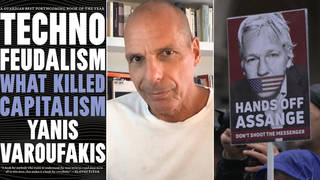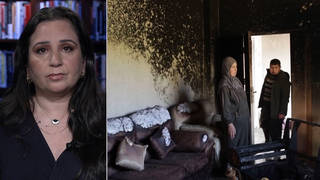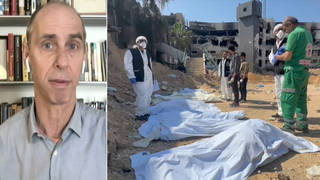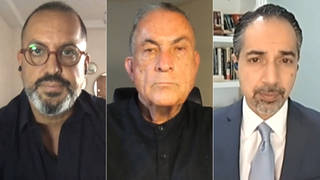
Related
Newly released documents show counterterrorism agents at the FBI have been monitoring domestic organizations active in causes as diverse as peace, the environment, animal cruelty and poverty relief. The documents came as part of a series of Freedom of Information Act lawsuits brought by the American Civil Liberties Union. We are joined today by members of three groups under FBI surveillance: Greenpeace, PETA and the Catholic Worker. [includes rush transcript]
Newly released documents show counterterrorism agents at the Federal Bureau of Investigation have been monitoring domestic organizations active in causes as diverse as peace, the environment, animal cruelty and poverty relief.
This is the third major recent revelation about domestic spying in the last few days. Last week NBC News revealed the Pentagon has been monitoring peaceful anti-war protesters and the New York Times exposed how President Bush ordered the National Security Agency to eavesdrop on Americans without court-approved warrants. The latest batch of files totals more than 2,300 pages and centers on references in internal files to a handful of groups including Greenpeace, Catholic Worker, the American-Arab Anti-Discrimination Committee and PETA, the People For the Ethical Treatment of Animals. The documents indicate the FBI monitored protests organized by the groups and used confidential informants inside the organizations to gain intelligence. One document indicates that FBI agents in Indianapolis planned to conduct surveillance as part of a “Vegan Community Project.” Another document talks of the Catholic Workers’ “semi-communistic ideology.” A third indicates the bureau’s interest in determining the location of a protest over llama fur planned by People for the Ethical Treatment of Animals. Many of the investigative documents turned over by the bureau are heavily edited, making it difficult or impossible to determine the full context of the references and why the F.B.I. may have been discussing events like a PETA protest.
- Matt Daloisio, of the New York Catholic Worker.
- John Passacantando, Executive Director Greenpeace USA.
- Jeff Kerr, General Counsel of PETA, People for the Ethical Treatment of Animals.
Transcript
AMY GOODMAN: We talk to the watched, Jeff Kerr, General Counsel and Director of Corporate Affairs of PETA, People for the Ethical Treatment of Animals; Matt Daloisio of the New York Catholic Worker; and John Passacantando of Greenpeace USA, he’s the Executive Director. Let’s begin with John Passacantando; what do you know about what they know about you?
JOHN PASSACANTANDO: Well, good morning, Amy. We know that the F.B.I., since January 1, 2000, gathered approximately 2,400 pages of information on Greenpeace. This is everything from copies of web pages to reports by corporate-funded think tanks doing analysis of Greenpeace; it’s clippings; it’s write ups of protests, peaceful protests that we have engaged in; and that’s about half of it. The other half of it has been redacted. It’s blanked-out pages. So you can’t tell if there’s eavesdropping. You cannot tell if there’s intercepted email traffic. You simply can’t tell; you get multiple boxes of photocopied paper, and only half of them actually have the print still on them.
AMY GOODMAN: Jeff Kerr, you’re with PETA, People for the Ethical Treatment of Animals. We have been looking at documents that are almost fully redacted, except for the name of PETA.
JEFF KERR: Good morning, Amy. Yes, you’re right. What the documents show, as far as we can tell, is a gross abuse of power and a waste of resources, as the F.B.I. investigates and infiltrates an organization that it admits in these documents is a lawful charity engaged in First Amendment-protected free speech activity. It’s outrageous, and this kind of secret spying has got to stop.
AMY GOODMAN: What exactly do you understand the F.B.I. has been doing in your case?
JEFF KERR: Well, to the extent we can glean it from the documents, we know they’re surveilling speeches on college campuses. We know they have gone to some of our protests on public sidewalks, where people are laying naked in a cage to protest cruelty in the fur trade, and we know that they have harassed and questioned our employees on roadsides, and we know they have gone to their homes and businesses to interview them. There’s really just such a wasteful type of threat that comes through this, and one indication in one of the documents, Amy, there’s reference made where they accuse us of being actively involved in a campaign against a company that we had protested six years before that and hadn’t done anything previously. You know, the American people know the difference between a terrorist and somebody in a chicken suit handing out a leaflet against KFC’s practices. But the F.B.I. apparently doesn’t seem to know that.
AMY GOODMAN: Matt Daloisio, you’re with the New York Catholic Worker. What have you read in the documents?
MATT DALOISIO: From the documents I’ve seen, it looks like the F.B.I. was concerned with the Los Angeles Catholic Worker and their work around Vandenberg Air Force Base and National Missile Defense. Mostly, it seems just sad that the F.B.I. would use resources to investigate a group that’s always open about what we do and take responsibility for what we do and is really based in a faith that believes in the God-given dignity of every human being.
AMY GOODMAN: The documents refer to the Catholic Worker’s semi-communist ideology.
MATT DALOISIO: Yes, I guess if we are against war and working with people who are poor, that makes us semi-communistic.
AMY GOODMAN: You have just returned from a very unusual protest, perhaps the first of its kind, a group of people who went down to Cuba, walked — why don’t you describe what you did?
MATT DALOISIO: It was a group of 25 people, mostly Catholic Workers, ranging in age from 24 to 79, who walked 107 kilometers from Santiago to Cuba to Guantanamo, to the military checkpoint outside Guantanamo, where we stayed for four days, fasting and praying and calling on the White House, the State Department and the Pentagon to let us in to visit the prisoners. George Bush had invited the international community down if they thought that torture was happening at the base, and we accepted his invitation.
AMY GOODMAN: What happened when you got there?
MATT DALOISIO: Our phone calls were transferred around, and we weren’t allowed into the base, but we were able to maintain a presence there, 15 kilometers from the prison itself, closer than family members of these men have been in the last four years.
AMY GOODMAN: Do you know if any of them were aware of your presence?
MATT DALOISIO: We have word from lawyers who are representing people at Guantanamo that they are going to inform the prisioners that we have responded to especially those on hunger strike, who now are being force-fed.
AMY GOODMAN: Isn’t the area around Guantanamo, this unusual situation where the U.S. has a military base there, but, of course, it’s surrounded by Cuba, that it’s the most heavily land-mined area around that base?
MATT DALOISIO: Yes, it’s a U.S. base on sovereign Cuban territory. There’s a U.S. fence, and then a no man’s land full of land mines, and then a Cuban fence. And we were about seven kilometers from the Cuban fence, in what is a Cuban military zone.
AMY GOODMAN: What were the Cubans’ response to this walk?
MATT DALOISIO: We were very open about what we wanted to do, and we were able to work with the Cubans so that we didn’t put any Cubans at risk. We know we come from a country that just invaded another country based on lies, and we didn’t want to cause any provocation or problems for Cuba.
AMY GOODMAN: How did the people of Cuba respond?
MATT DALOISIO: We were able to set up camp in people’s backyards in Cuba, and the hospitality was amazing. Try to imagine 25 Cubans showing up at an American’s front door, asking if they could pitch their tents. So we were very lucky with our interactions with the Cuban people.
AMY GOODMAN: Jeff Kerr, what about the issue of informants in PETA? How exactly is this monitoring taking place? What’s your understanding?
JEFF KERR: Well, there are sort of two responses to that. The first one, to kind of touch on what John said at the outset, and that is how silly it is that they would need to do that for organizations like those represented on this call, that are completely open about everything they do. For example, with PETA, we send out press releases about all of our activities, and you can go to our website at PETA.org to see everything that we do.
The second point, though, Amy, and the things that’s the most concerning is that people don’t really know. The American people don’t fully know how these infiltrations are being done, the Congress doesn’t know, and that’s part of the problem with this kind of secret domestic spying. The notion that anybody can infiltrate a completely open organization is silly and further indication of a waste of resources.
AMY GOODMAN: We were just showing a document on our TV broadcast, and for radio listeners, we’ll put it online at DemocracyNow.org, that says that PETA imports people from Asia or brings them in to commit criminal acts.
JEFF KERR: I must have missed that job description, but, I mean, it’s just beyond ludicrous that something like that would even make it into an F.B.I. file. You know, like I said, any thinking person knows the difference between somebody standing on a street corner and handing out a leaflet or engaging in protest and actively working for change in this society, whether it be for animal protection, the environment, for peace, whatever it may be, but, you know, there’s this wastefulness of resources, and what can only be seen as targeting people, because of this acknowledgement of this lawful activity by the F.B.I., can only be seen as a targeting of people because of the company they keep and the points of view that they espouse, and that’s just wrong.
AMY GOODMAN: John Passacantando, head of Greenpeace, The New York Times says, “In the case of Greenpeace, which is known for highly publicized acts of civil disobedience, like the boarding of cargo ships to unfurl protest banners, the files indicate that the F.B.I. investigated possible financial ties between its members and militant groups like Earth Liberation Front and Animal Liberation Front. These networks, which have no declared leaders and are only loosely organized, have been described by the F.B.I. in congressional testimony as extremist special interest groups whose cells engage in violent or other illegal acts, making them a serious domestic terrorist threat.” Your response?
JOHN PASSACANTANDO: Well, it’s a classic smear campaign. This administration has used the power it was able to consolidate post-9/11 to turn around and not find the terrorists, not find the threats to the country, but to try to intimidate the peaceful groups that oppose this administration’s policies, whether it be foreign wars or rolling back environmental laws. So, you have a group like Greenpeace, we have a perfect 35-year record of nonviolence, of peaceful activities, but we also have a record of opposing those in power who are destroying our environment.
And so, what do we get? We get a massive F.B.I. file. We get all sorts of surveillance. We just finished a three-month audit. The IRS, they told us it was a politically referred audit. They came in, they were in our offices for three months. Now, we came out with a clean bill of health. They came out, raving about the way we keep our books. Nevertheless, what you end up reading in The New York Times is that the F.B.I. is investigating links. It’s a smear campaign. What we’ve got is a return to Hoover’s F.B.I., Hoover’s F.B.I. which was insinuating things about Martin Luther King. You have a return to Nixon’s IRS, where they were literally doing IRS audits against the organizations and people on Richard Nixon’s enemies list. That is what we have returned to today under George Bush and Dick Cheney.
AMY GOODMAN: John Passacantando, I want to thank you for being with us, of Greenpeace USA; Matt Daloisio, a member of the New York Catholic Worker; and Jeff Kerr, General Counsel and Director of Corporate Affairs. PETA. People for the Ethical Treatment of Animals.












Media Options